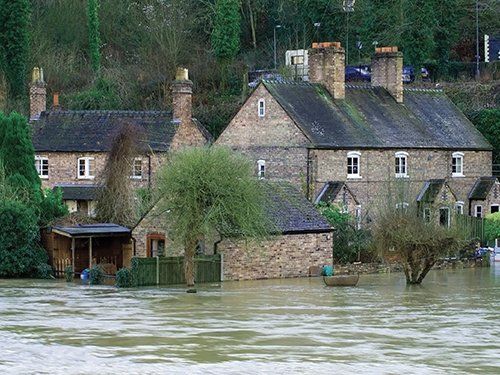What you Should Know About Flooding In England
Flooding in England - Past, Present and Future

With so little rain these last few months it is easy to forget how much rain and flooding we had earlier in the year. Last week our surface water team attended an online lecture, ‘Flooding in England – Past, Present and Future’, presented by John Curtin, the Executive Director of Flood and Coastal Risk Management at the Environment Agency.
In the lecture, John covered a range of aspects, from the scale of flood risk in England to historical flood events, the impact of recent floods and how we, as a country, can become resilient to flooding and coastal change in the future.
The lecture began with historic flooding events, of which there have been many and will continue to be. As a country, we have built infrastructure and developed around rivers and by coastal areas due to water being an essential resource. We will never be able to eliminate the risk of flooding; however, we can reduce the impacts and improve our resilience to flooding.
Covering the issues and outcomes of present flooding around the country, it was noted that due to the amount of flood protection we currently have in place, the population generally has limited knowledge of the actual level of flood risk across the UK. An example of this is the Thames Barrier, one of the largest ‘movable flood barriers in the world’, which protects central London from flooding due to tidal surges. The 10 steel gates which make up the barrier are raised and lowered in relation to the tide and volume of water. Each one of these gates weighs 3,300 tonnes and is as tall as a 5-storey building. The barriers provide significant flood management and the fact that it is not common knowledge that places such as London are still high-risk flood areas can create complacency which can make the outcomes of flooding worse, on the occasions when flooding does occur.
With the rise in technology and the role it plays in communication and providing information, it is a widely used resource to locate flood risk areas along with flood risk on personal homes and developments.
For future flooding events, we must not only think about the physical effects, but also the effect it has on individuals and communities. We must also be aware that flooding occurs at different scales; national, regional and individual. Each of these require different actions and responses to be taken as flooding is not a static event, therefore we need to vary our ways of managing floods.
Three Main Challenges We Face as a Nation
Adaptation is not failure. With climate changing and new developments continually being built, new and different floods will occur, requiring new ways to mitigate the outcomes. By adapting, we will learn how to deal with the effects and ultimately increase resilience.
Balance. There is a common pattern between developed and undeveloped countries in relation to their views on flooding. In undeveloped countries where there is often a lack of funding and flood defences in place, communities have a high resilience to flooding, compared with that of developed countries where flood management is in place. Floods are not a common hazard to communities and therefore resilience is low.
Flooding is not a static process and constantly changes, therefore we have to constantly review and change how we manage and mitigate flooding, by starting to prepare for what might come.
Envireau Water specialises in the assessment and mitigation of flood risk. We have carried out Flood Risk and Drainage Assessments to support planning applications and Environmental Impact Assessments for a wide range of developments. Our team of skilled hydrologists and hydrogeologists have expert experience with negotiating permissions and consents in areas prone to flooding. If you require support with a project get in touch with LeeClarke@envireauwater.co.uk to see how we can help.







